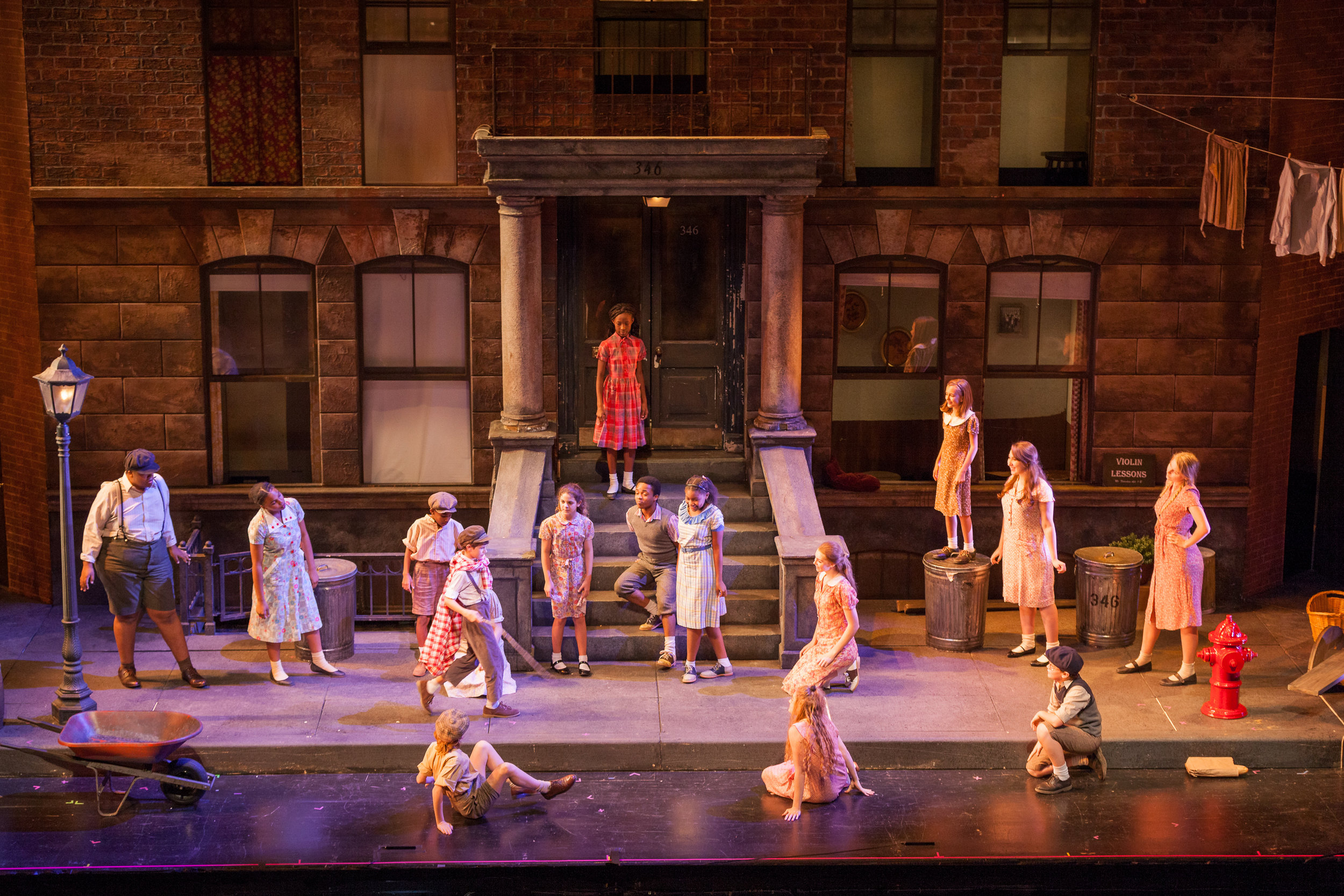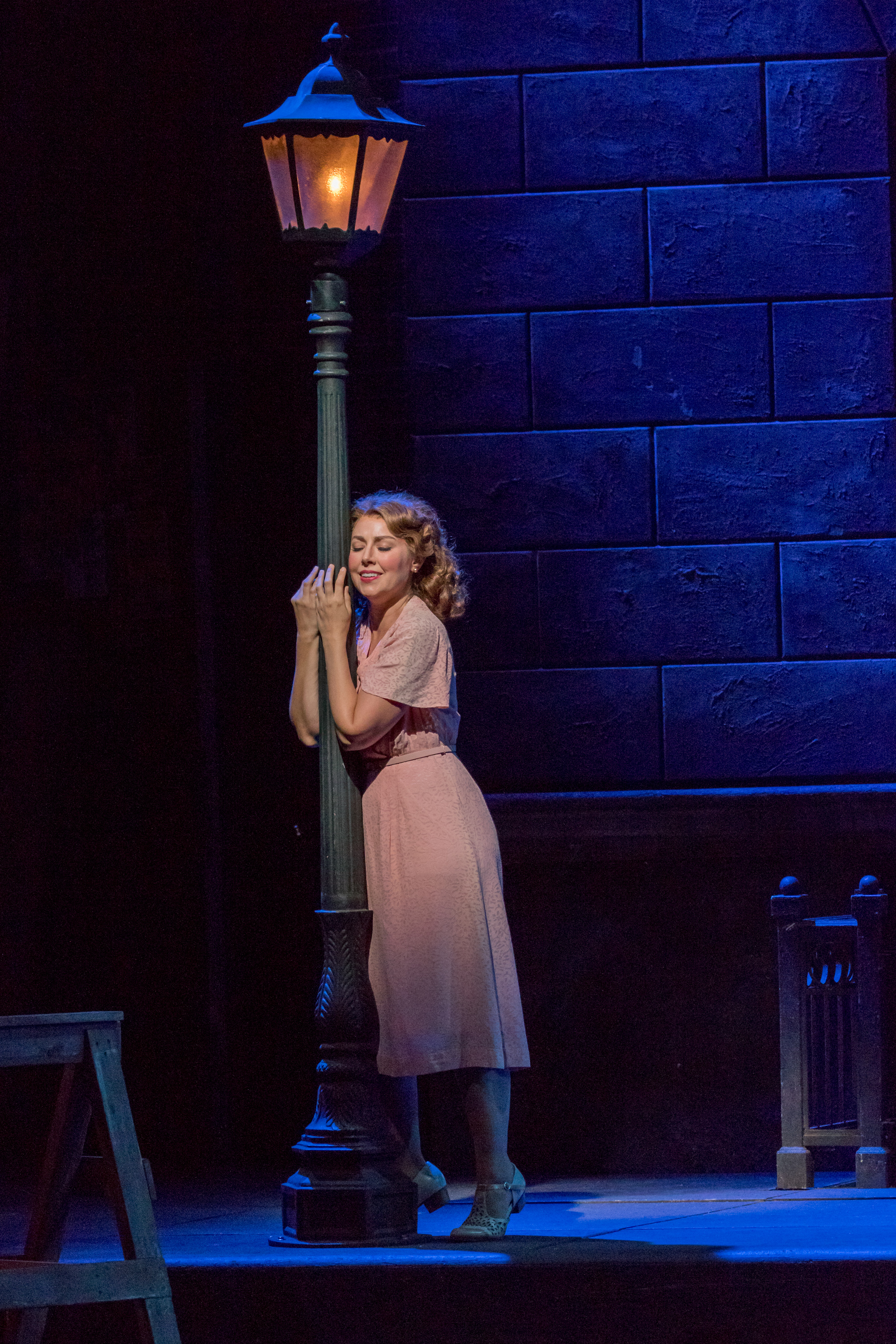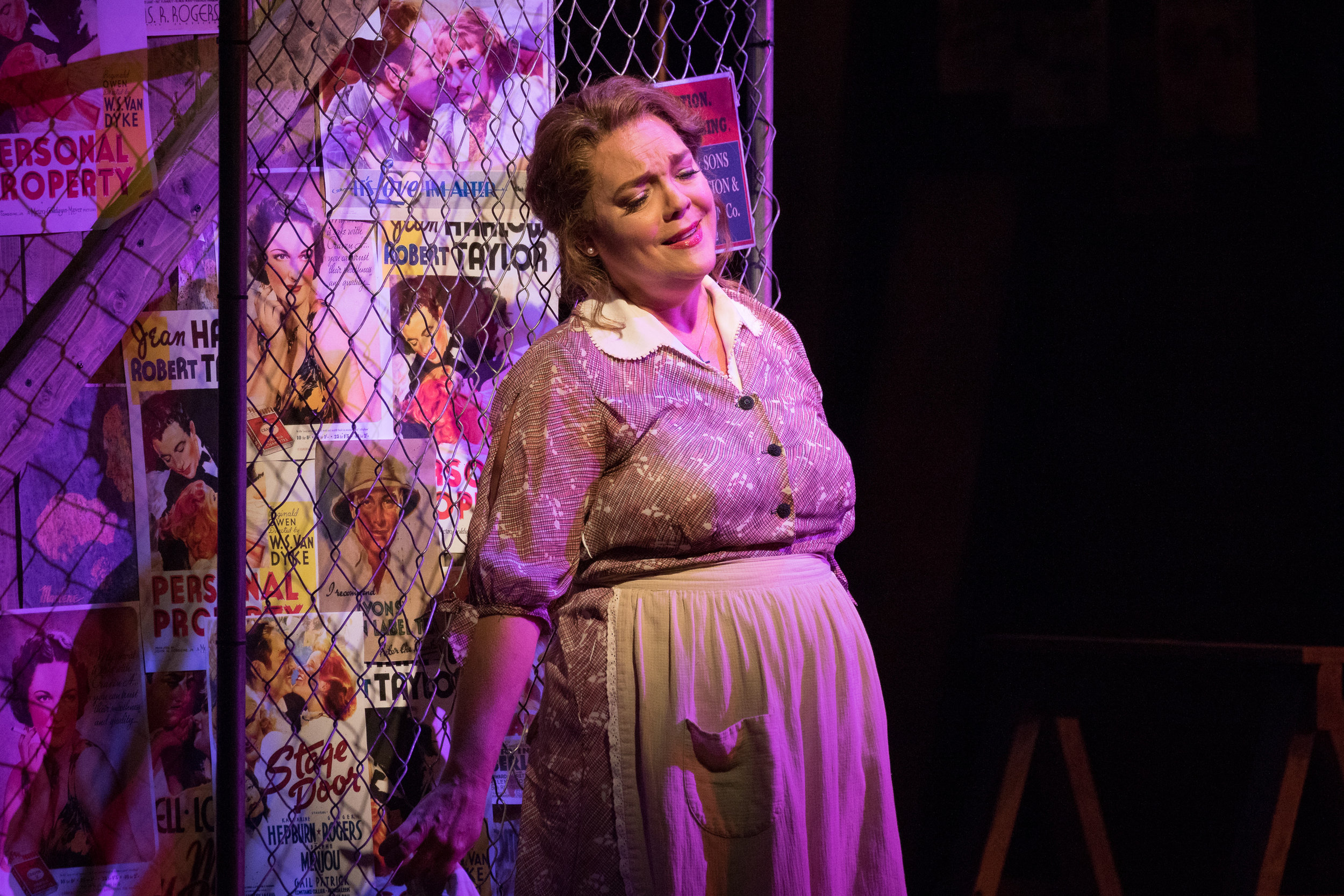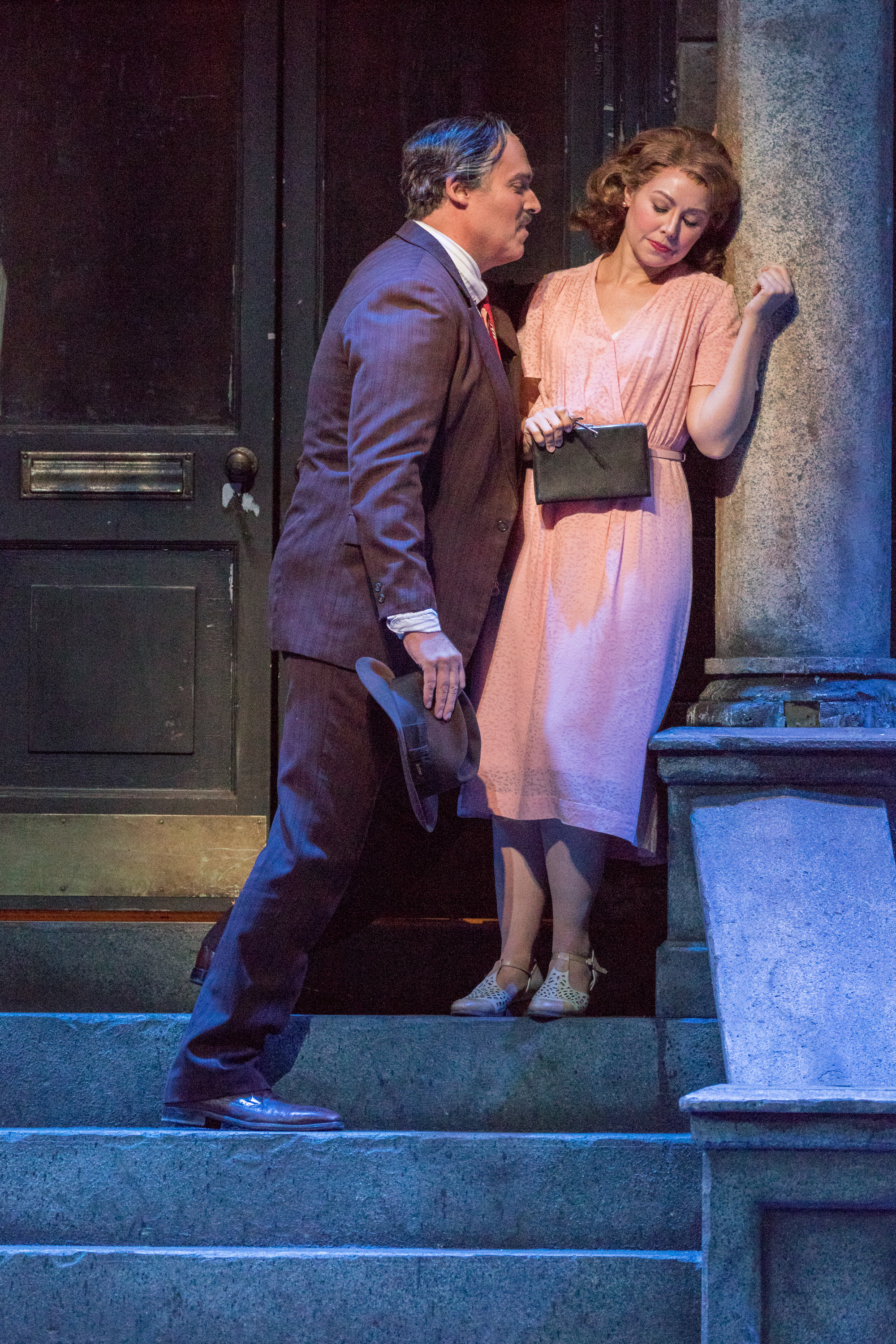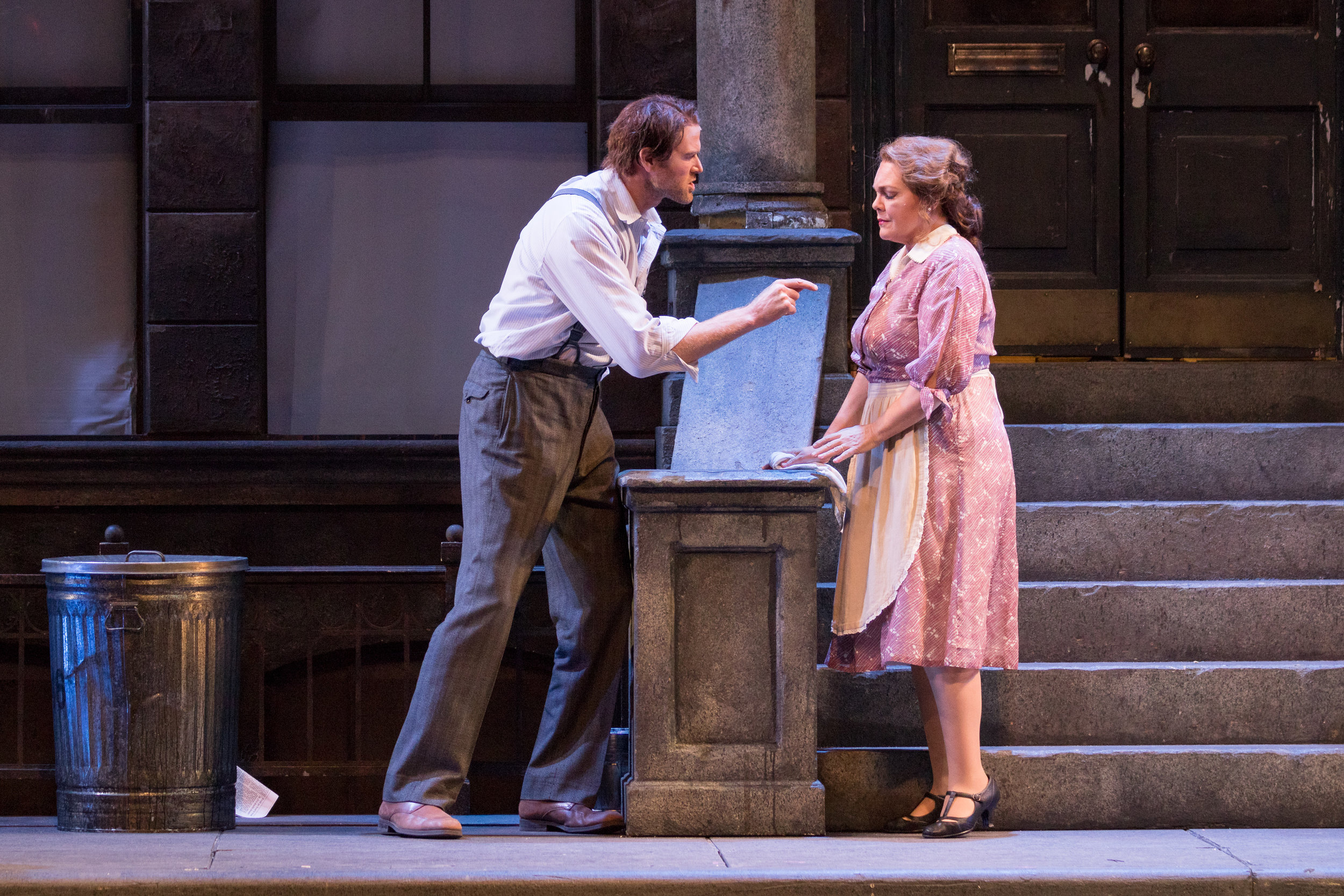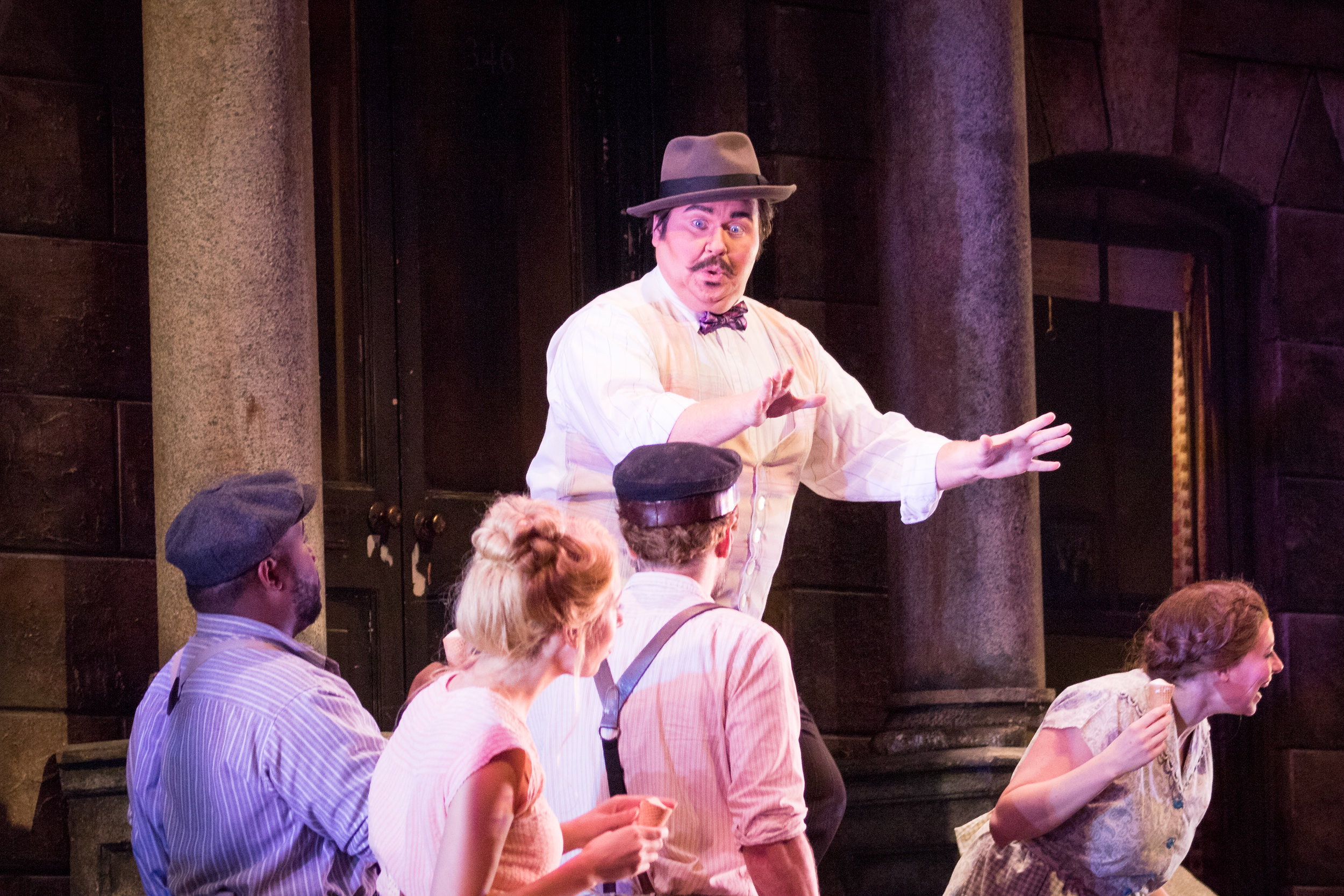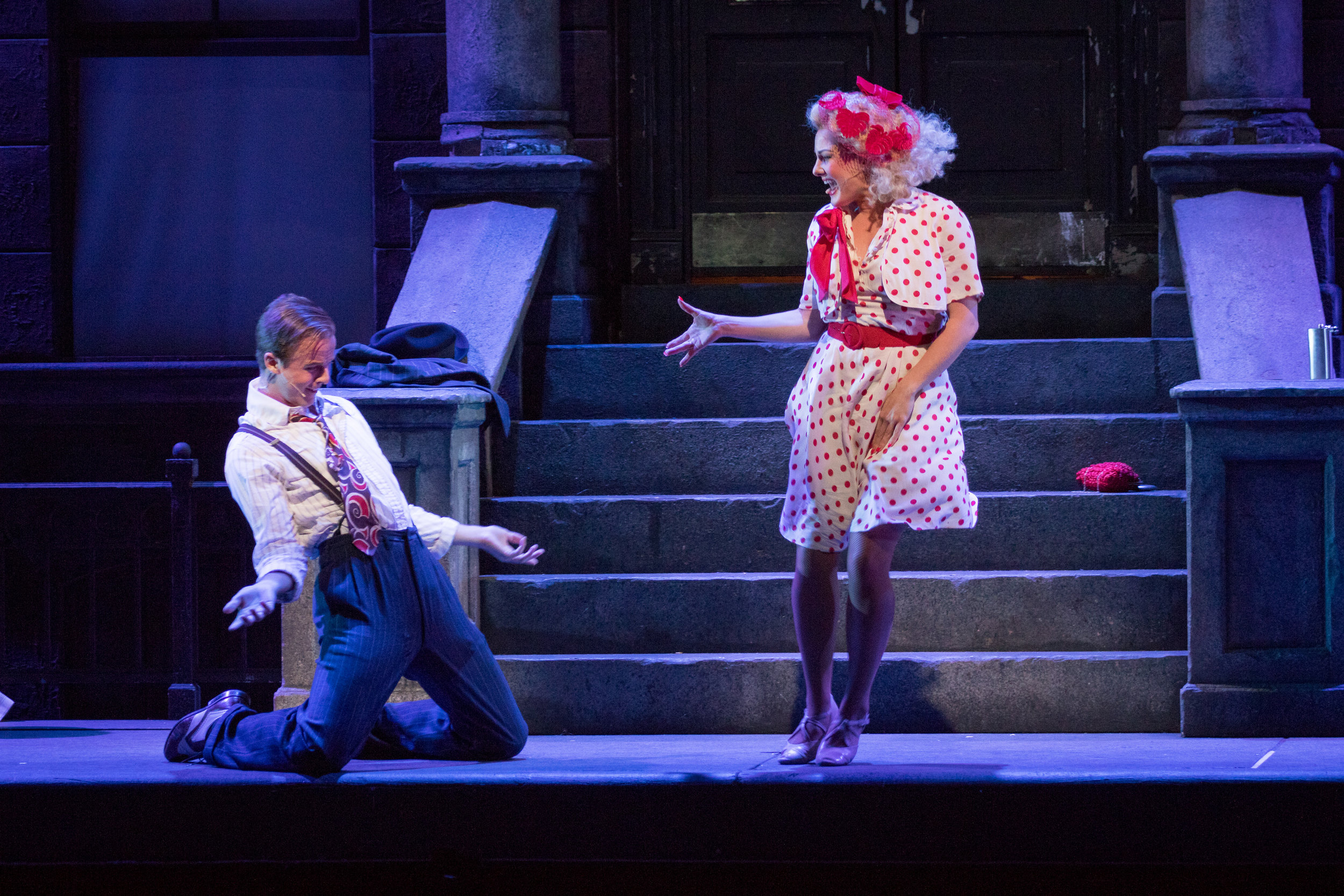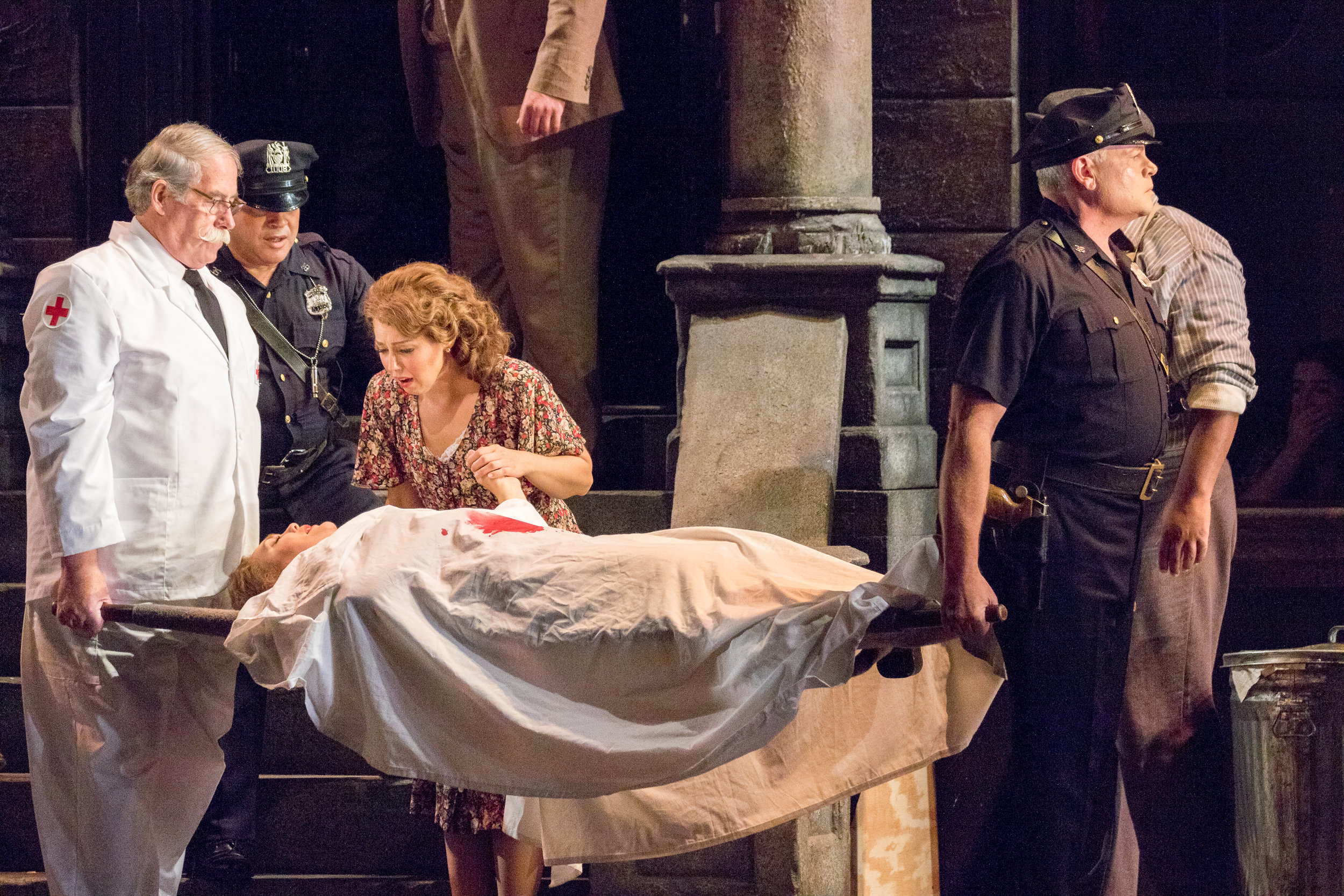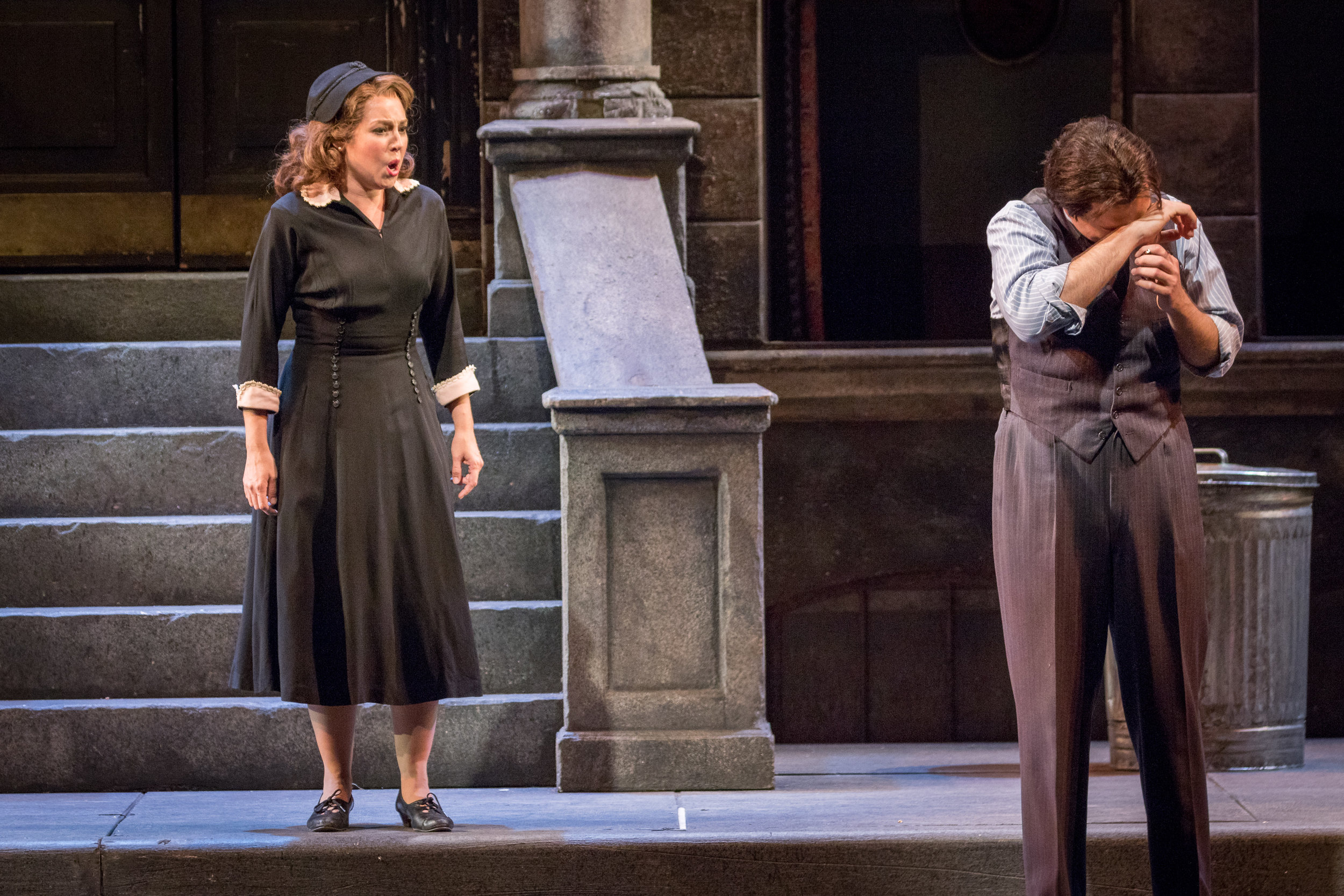Virginia Opera’s Street Scene provides a trip back into time and points to a future that did not happen as yet, though it allows us to live with the hope that it may still. As I walked back to my car on Sunday afternoon, I felt a strange mix of nostalgia and unease. It felt like I had sat down, flipping through an album of old photographs, remembering people and events, some good and some not so good – a forgotten, once cherished friend, an alcoholic uncle, an aunt with loose morals, a mother killed - while at the same time, an ethereal DJ played a mash up of songs going as far back as the pages I turned. And as I put the album down, got up, and walked away, I wasn’t sure if I was walking in the past, the present, or the future, or a dream; all of the characters that had walked out on the stage had blended with those in my real life. If you want affecting drama, this is it.
Children playing a game in Kurt Weill’s Street Scene. Photo by Ben Schill Photography; courtesy of the Virginia Opera.
Street Scene begins with its only set and it’s a fine one, the facade of a brick and stone tenement in 1940s New York City and the sidewalk and street in front carrying local traffic and passersby and residents hanging about. In the course of a day, compressed into a two-and-a-half-hour opera, we meet and are touched by the lives of over thirty men, women, and children. The set and costumes give this period piece just the right feel. Kudos to David Hartwell for the original scenic design for Center City Opera and to Aaron Chvatal for the original costume designs for Brevard Music Center. And special kudos to Director Dorothy Danner who, as the action begins, brings it all to life in a most effective and engaging way with each vignette flowing seamlessly into the next; well done!
left: Maureen McKay as Rose Maurrant. right: Jill Gardner as Anna Maurant. Photo by Ben Schill Photography; courtesy of the Virginia Opera.
While many stories are told, the opera’s focus is on the Maurrant family where the mother Anna (soprano Jill Gardner), out of quiet desperation for affection, has begun an affair with the milkman (ask your grandparents who those were), a scandal to the gossipy neighbors who live in the large tenement building alongside her. Her husband Frank (bass Zachary James), an embittered, threatening man comes home early to find his wife with her lover and dispatches both of them. Their teenage daughter Rose (Maureen Mckay), is emotionally involved with Sam Kaplan (David Blalock), a young man in the tenement, but works for a boss trying to make her a conquest, with behavior that would get him fired today, we hope. As a result of the turmoil of her parent’s and her own lives, she makes an insightful decision about marriage and her future to close the show. Street Scene not only engages personal longings, but social issues as well, a fact that may have limited it popularity. We are presented with Sam’s dad Abraham (Alan Fischer), who vehemently spouts socialist rhetoric on issues still confronting us today.
left: Zachary James as Frank Maurrant and Jill Gardner as Anna. right: Peter Kendall Clark as Harry Easter, Rose’s boss, and Maureen McKay as Rose. Photo by Ben Schill Photography; courtesy of the Virginia Opera.
Composer Kurt Weill’s music in Street Scene is a blend of musical genres, show tunes, jazz, blues, and doing the heavy lifting, opera. If you like forties/fifties musicals, you should like this opera. When it premiered on Broadway, it ran for 148 straight performances. Played by the Virginia Opera Orchestra, led by Conductor Adam Turner (also now Artistic Director), the music jitters and bugs its way and puts us in the mood for the ups and downs of the lives being witnessed, paving the way for the emotionally intense arias connecting us to the unfolding drama. Ensemble pieces provide some fun and lighten the mood, such as an ode to ice cream, a stand out song and dance number “Moon-Faced, Starry-Eyed” by dancers/singers Ahnastasia Albert and David Michael Bevis, and a delightful children’s number “Catch Me If You Can”, infused with the sting of class conscientiousness. In recent times, Street Scene has been adopted by opera companies; I have been listening to the album by the original Broadway cast. The music is really good, and I find myself surprised this work has not been revived on Broadway.
left: Benjamin Werley as Lippo Fiorentino singing about ice cream. right: Song and dance by David Michael Bevis as Dick McGann and Ahnastasia Albert as Mae Jones. Photo by Ben Schill Photography; courtesy of the Virginia Opera.
I will single out just a few of the players for comment, but I emphasize that the cast was uniformly excellent and contributed to cohesive storytelling through their acting and singing. Here are a few personal favorites that stand out in memory:
Soprano Jill Gardner delivers again for VA Opera, with a moving and emotionally sung portrayal of Anna Maurant; I loved her aria “Somehow I Could Never Believe”.
Soprano Maureen McKay moves easily between musical theater and opera in a convincing portrayal of Rose Maurrant; she seems a natural for musical theater.
Baritone Trevor Neal who plays the janitor had a voice that wrapped itself around the stage and a poignant song, “I Got a Marble and a Star”.
Baritone Peter Kendall Clark plays the despicable boss and yet has such stage presence and sings so well that I almost liked him.
Mezzo-soprano Margaret Gawrysiak as the nosy neighbor Emma Jones handles this role so believably that she almost goes unnoticed; she shouldn’t be.
Soprano Brooke Nicole Jones as the young Jennie who just got a scholarship represents the promise of youth; her colorful voice singing “ Wrapped in a Ribbon and Tied in a Bow” made me want to hear more of her.
Talin Nalbandian who pays Nursemaid #1 in a minor role reveals a lovely mezzo-soprano voice that I want to hear more of also.
left: Rose (Maureen McKay) holds her mothers hand as she is taken away. right: Rose (Maureen McKay) gives her decision to Sam (David Blalock). Photo by Ben Schill Photography; courtesy of the Virginia Opera.
Street Scene is not without issues, I think. Both the plot and musical development are somewhat dated at this point. The inventiveness and universal elements shine through but the fashion and references are out of date. Some of the stereotypes, such as the Italian Mr. Fiorentino (tenor Benjamin Werley), are over the top for today. Frank Maurrant’s character is so one-sided he simply becomes a villain, not at all a sympathetic character, making his closing aria “I Loved Her Too” impossible to believe. The musical genres mostly line up separately; I wish composer Weill had not died so young; perhaps he would have further developed their integration. My son had an interesting perspective on the plot development. He would have finished off Ms. Maurrant in Act I to make room for greater development of the Rose character in Act II. He wanted to know how Rose’s beautiful insight that you ought to belong to yourself played out.
Poet and librettist Langston Hughes used Elmer Rice’s eponymous play to give us a look at ourselves in 1946 so we might overcome our circumstances. Kurt Weill meant this to be something new, a fusion of opera and musical theater, an American form of opera (see my blog report on Virginia Opera’s new season for more background). Neither the opera nor the drama seems to have had the influence that we might have wanted. The personal, social, and political issues unveiled still remain in some form. New opera is still searching for its direction, and if this team were writing this today and how I wish they were, the only new human element might be disillusionment that the same problems remain, as Mr. Hughes puts it, ‘between the cries of being born and the moans of dying’. Finally, what about Rose? Did she manage to belong to herself?
Street Scene is a find. I love the traditional great operas, but I would also like to see more contemporary verismo operas that present people today as they are, that I can more easily relate to, not Greek gods and medieval nobility, and that offer new musical approaches. With such a large cast, this could not have been an inexpensive opera to mount. Kudos to Virginia Opera for their vision and courage to bring to Virginia audiences important works that are outside the traditional repertoire.
The Fan Experience: There are two more performances of Street Scene, on Friday evening, October 12 and Sunday afernoon, October 14 in Richmond; use this link for tickets. I recommend that you arrive for the pre-opera talk 45 min before the opera by Dr. Glenn Winters, VA Opera’s Musical Outreach Director, and read his series of blog reports on the opera. He compares Street Scene to other operas and points out the musical homage that Kurt Weill makes to other composers, and gives you hints on things to listen for; his insights into the music and the drama will add to your enjoyment of the performance.

